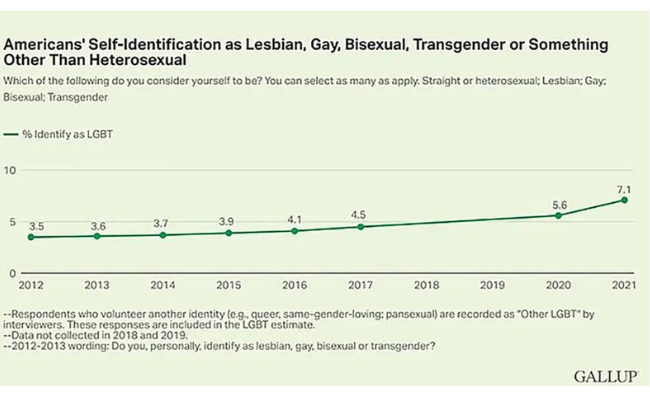CDC study finds record low number of teens identifying as heterosexual
Are teens today more radical when it comes to sexuality? The answer might be yes. This is according to a new study from the Centers for Disease Control and Prevention (CDC).
The research shows that a low number of teens classify themselves as heterosexual. This trend could affect how we see and approach sexual identity in younger people.
According to CDC’s report, 25% of high school students classify themselves as bisexual, homosexual, or unsure of their sexuality. The agency surveyed 17,232 students and found that 3/4 of teens between 14 to 18 years old were interested in the opposite sex.
They marked the remaining respondents as “other” at 9% and lesbian or gay at 3%. In addition, bisexuals are nearly 12% of the total number of respondents.
Fewer teens than ever identify as heterosexual, according to a recent CDC report. pic.twitter.com/pDT292LvPi
— 6ixBuzzTV (@6ixbuzztv) April 28, 2023
Understanding the CDC’s findings on teen sexuality
The numbers on the report show the highest percentage of non-heterosexual students on record. It comprises nearly 1 in 4 high school students identifying themselves as non-heterosexual.
Moreover, the report also revealed that LGBTQ individuals continue to grow each year. A Gallup poll in February found that 7.2% of adult Americans classify themselves as “something other than heterosexual.” The highest percentage belongs to Gen Z.
According to experts, the growing number of non-heterosexual identification may not prove that fewer individuals are heterosexual. But, it demonstrates that more people are at ease expressing their identities and sexual preferences.
You may also like: To be or not to be LGBTQ

Photo Credit: news.gallup.com
In addition, the younger generation is more open to accepting their non-heterosexual identities. They are also more active on social media as compared to older generations.
A developmental psychology professor at Cornell University, Ritch Savin-Williams, cited that social media has significantly increased awareness and viabilities of non-heterosexual identities.
He also noted that being non-heterosexual is not just a “passing fad,” but instead, it’s an expression of one’s authentic self. Furthermore, some state lawmakers in Florida have broadened the “Don’t Say Gay” bill despite the growing trend. These state actions make queer teens feel unwelcome.
The CDC suggests that schools take a more inclusive way of creating a safer community for non-heterosexual teens. Initiatives like sexuality and gender alliances, anti-harassment policies, and safe spaces are some of the agency’s recommendations.
Factors affecting teen sexual identity
Moreover, the report also confirmed that LGBTQ students are more prone to negative mental health results like bullying, hopelessness, sadness, sexual violence, substance abuse, and suicidal thoughts or behaviors. These factors are trending in a negative direction as compared to past years.
You may also like: Monday Motivation Quotes To Get You Through the Day
Overall, the CDC’s recent report reveals that there are a lesser number of teens who identify themselves as heterosexual. It confirms what researchers have been monitoring for years. Young people’s gender identity and sexuality are becoming more complex and diverse.
Thus, the importance of sex education to go further in basic anatomy and biology is a major player. It is also essential to encompass affective, behavioral, and cognitive domains.
Another integral part for researchers is to recognize the differences among LGBTQ+ people and take steps to ensure that all voices are acknowledged. Moving forward, the continuous study and understanding of the evolving landscape of gender identity and sexuality among young people is vital.

